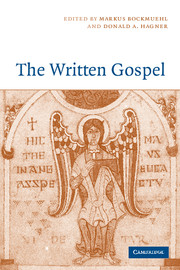Book contents
- Frontmatter
- Contents
- List of contributors
- List of abbreviations
- Introduction
- PART I BEFORE WRITING
- PART II WRITING THE FOUR GOSPELS
- PART III AFTER WRITING
- 11 The Four among Jews
- 12 The Four among pagans
- 13 Forty other gospels
- 14 The One, the Four and the many
- 15 The making of gospel commentaries
- Appendix: Graham Stanton's publications
- Bibliography
- Index of ancient sources
- Index of authors
12 - The Four among pagans
Published online by Cambridge University Press: 07 December 2009
- Frontmatter
- Contents
- List of contributors
- List of abbreviations
- Introduction
- PART I BEFORE WRITING
- PART II WRITING THE FOUR GOSPELS
- PART III AFTER WRITING
- 11 The Four among Jews
- 12 The Four among pagans
- 13 Forty other gospels
- 14 The One, the Four and the many
- 15 The making of gospel commentaries
- Appendix: Graham Stanton's publications
- Bibliography
- Index of ancient sources
- Index of authors
Summary
Round about 175 ce, an otherwise unknown Platonist philosopher named Celsus wrote a hard-hitting polemical tract against the Christians which he modestly entitled The True Logos. Whether Celsus' polemic had any impact on pagan opinion is unclear. But it must have survived, and worried at least some Christians enough to consider that it needed answering, because some seventy years later Origen was asked to provide a systematic refutation of Celsus' tract; and it is because of this that Celsus' polemic survives, in the form of embedded quotations within Origen's reply. In this chapter, I shall focus largely on pagan reception of the gospel story up to and including Celsus, concluding with a brief survey of third- and fourth-century developments in the pagan–Christian conversation. Since my concern here is with pagan reception of the gospels, I have not included writers like Pliny, Fronto or Suetonius, who deal with Christianity as a social phenomenon. Nor have I sought to unravel the pagan testimony to the historical Jesus, which raises a different set of questions. Instead, I have tried to build up a picture of the gospel story as viewed by second-century pagans, asking the question, What did pagans know of the Christian story of Jesus, and when and how did they know it?
Celsus' polemic marks a watershed in the process of pagan engagement with the gospels.
- Type
- Chapter
- Information
- The Written Gospel , pp. 222 - 237Publisher: Cambridge University PressPrint publication year: 2005
- 11
- Cited by



